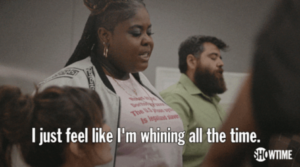Transcript of the video
If I was in a relationship with a boy and he left me for another girl, I can say "I guess he's happier with her".
It's in my imagination.
Bonjour tout le monde. I hope you're well and ready for a new video in French.
Today, we're going to look at the difference between "I suppose" and "I imagine".
Before you start, remember to activate subtitles if you need them.
If I speak too fast or too slowly, feel free to change the speed of the video.
In any case, I hope you enjoy this video and give it a "like" or a "thumbs-up".
I don't know if you watch the Netflix series "Emily in Paris".
But in season 2, specifically in episode 7, Emily's French teacher talks about the difference between je suppose and j'imagine.
She talks about the difference between the two.
(…)
She explains that most of the students in the class had difficulty with the test they had to do between the expressions j'imagine and je suppose.
So let's take a look together today.
In this scene from "Emily in Paris", the teacher explains that there is a difference.
In reality, these two expressions are very, very close and I don't think anyone is going to tell you or make a remark if you use j'imagine instead of je suppose or je suppose instead of j'imagine.
Simply because it means almost the same thing.
Let me explain the small nuance.
Although it's very similar, I imagine it's a little more abstract.
It's really as you think, it's a little more in your imagination, in your head.
In English, I imagine, it would be "I think so" or "I believe so".
I don't really like to go through English, but I know it helps some people to do so.
I'd prefer to stay really French, but I know it helps you so I'm trying to find similar expressions.
Whereas, I suppose, in English, it would really be "I suppose to".
I imagine is a little more abstract and I suppose is a little more concrete.
You guess! It's a little more assertive, shall we say.
I guess you could say it's to assert an opinion a little more strongly or to talk about something that's more concrete.
But as I was really telling you, in most cases, we're not going to make a difference.
For example, I could say if I was in a relationship with a boy and he left me for another girl, I can say "I guess he's happier with her".
So it's in my imagination, I imagine it.
I could also say I guess he's happier with her, but I guess as it's a bit more in my imagination is a bit more fitting.
If, for example, I'm with someone and I know they're on a diet, so they're trying to lose weight, I'm going to offer them a coffee and I'm going to say "I don't suppose you take sugar" because we're in a concrete situation, I know they're on a diet, but again, if I say "I don't suppose you take sugar", it's not offensive at all, you can say it.
It's a bit... It really depends a bit on the intensity you want to put into your sentence, but as I've told you many times in this video, it's really... The difference is really very, very, very subtle.
For my part, I use one or the other without really making a difference.
That's it for today. It's a fairly short video, but I really wanted to make it for you because I thought that if any of you were watching this "Emily in Paris" series, you might have wondered about the difference between, I guess and I imagine, as it's approached in the series.
If you liked the video, of course, please give it a thumbs-up and, above all, if you're new, subscribe so you don't miss any of my videos, and I'll see you very, very soon.








